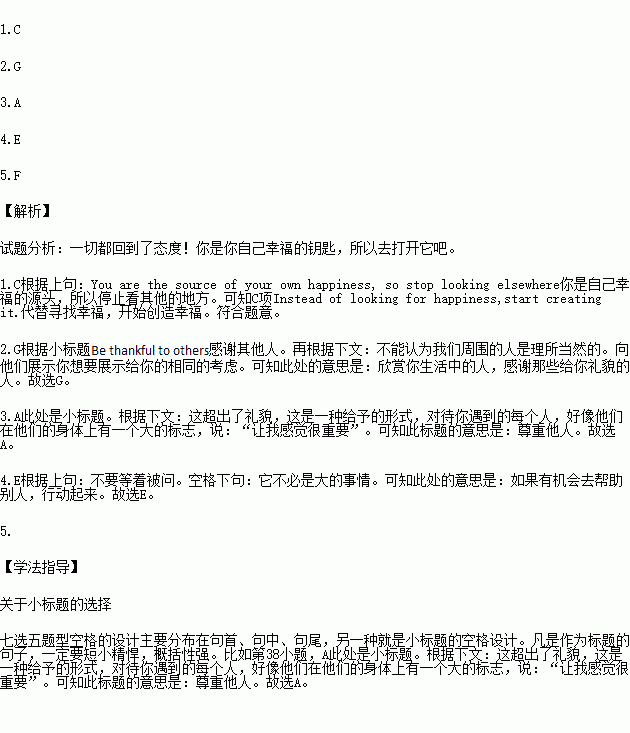题目内容
根据短文内容,从短文后的选项中选出能填入空白处的最佳选项。选项中有两项为多余选项。
It all comes back to attitude!
If you want to be happy you must take responsibility and stop expecting things or people to make you happy.You are the source of your own happiness, so stop looking elsewhere 1.________Here are a few ways for you to follow:
Be thankful to others. 2.______ It is too easy to take those around us for granted.Show them the same consideration you would like shown to you.
3.________ This goes beyond politeness; It is a form of giving.Treat everyone you meet as if they have a big sign on their body saying “Make me feel important.” If you do this you will discover a hidden source of joy.
Perform acts of kindness. Don’t wait to be asked. 4._______ It doesn’t need to be a big thing, hold the door for a stranger, or smile at anyone you meet. Look for opportunities to make others feel good.
Make a decision to be happy. This is the most important step on the road to a happy life. 5. ________ You are the key to your own happiness, so go ahead and unlock it .
A. Respect other people.
B. Be polite to other people.
C. Instead of looking for happiness,start creating it.
D. You can change your feelings by acting the way you want to feel.
E. If you see an opportunity to do something nice for someone else, do it!
F. Simply make up your mind to be the happiest person you know and you will be.
G. Appreciate the people in your life, and say thank you for any politeness they show you
A Language Programme for Teenagers
Welcome to Teenagers Abroad! We invite you to join us on an amazing journey of language learning.
Our Courses
Regardless of your choice of course, you’ll develop your language ability both quickly and effectively.
Our Standard Course guarantees a significant increase in your confidence in a foreign language, with focused teaching in all 4 skill areas----speaking, listening, reading and writing.
Our Intensive Course builds on our Standard Course, with 10 additional lessons per week, guaranteeing the fastest possible language learning (see table below).
Course Type | Days | Number of Lesson | Course Timetable |
Standard Course | Mon-Fri | 20 lessons | 9:00---12:30 |
Intensive Course | Mon-Fri | 20 lessons | 9:00---12:30 |
10 lessons | 13:00---14:30 |
Evaluation
Students are placed into classes according to their current language skills. The majority of them take on online language test before starting their programme. However, if this is not available, students sit the exam on the first Monday of their course.
Learning materials are provided to students throughout their course, and there will never be more than 15 participants in each class.
Arrivals and Transfer
Our programme offers the full package—students are take good care of from the start through to the very end. They are collected from the airport upon arrival and brought to their accommodation in comfort. We require the student’s full details at least 4 weeks in advance.
Meals/Allergies(过敏)/Special Dietary Requirements
Students are provided with breakfast, dinner and either a cooked or packed lunch(which consists of a sandwich, a drink and a dessert). Snacks outside of mealtimes may be purchased by the student individually.
We ask that you let us know of any allergies or dietary requirements as well as information about any medicines you take. Depending on the type of allergies and/ or dietary requirements, an extra charge may be made for providing special food.
1.How does Intensive Course differ from Standard Course?
A. It is less effective. B. It focuses on speaking.
C. It includes extra lessons. D. It give you confidence
2.When can a student attend Standard Course?
A. 13:00-14:30 Monday. B. 9:00-12:30 Tuesday
C. 13:00-14:30 Friday. D. 9:00-12:30 Saturday.
3.Before starting their programme, students are expected to _____.
A. take a language test
B. have an online interview
C. prepare learning materials
D. report their language levels
4.With the full package, the programme organizer is supposed to_____.
A. inform students of their full flight details
B. look after students throughout the programme
C. offer students free sightseeing trips
D. collect students’ luggage in advance
5.Which of the following may require an extra payment?
A. Cooked dinner. B. Mealtime dessert.
C. Packed lunch. D. Special diet.
假如你叫李华,你的加拿大笔友James想了解一下你要参加的2012年全国中学生英语夏令营的有关情况,请根据以下信息给他写一封回信,并邀请他参加你们的活动。
营址 | 大连 |
活动时间 | 2012年7月底,共4天 |
参加人员 | 1.全国中学生英语能力竞赛获奖者 2.中国,美国和澳大利亚的英语老师 |
活动内容 | 1.举行英语演讲比赛 2.观看学生表演 3.游览大连风景名胜 4.交流英语学习经验 |
注意:1.信须包括以上提供的内容要点,可以适当增加细节,使内容连贯;
2.词数:100左右;
3.参考词汇:全国中学生英语能力竞赛NEPC
Dear James,
Nice to hear from you again!
__________________________________________________________________________________________________________________________________________________________________________________________________________________________________________________________________
Best wishes,
Yours,
Li Hua

